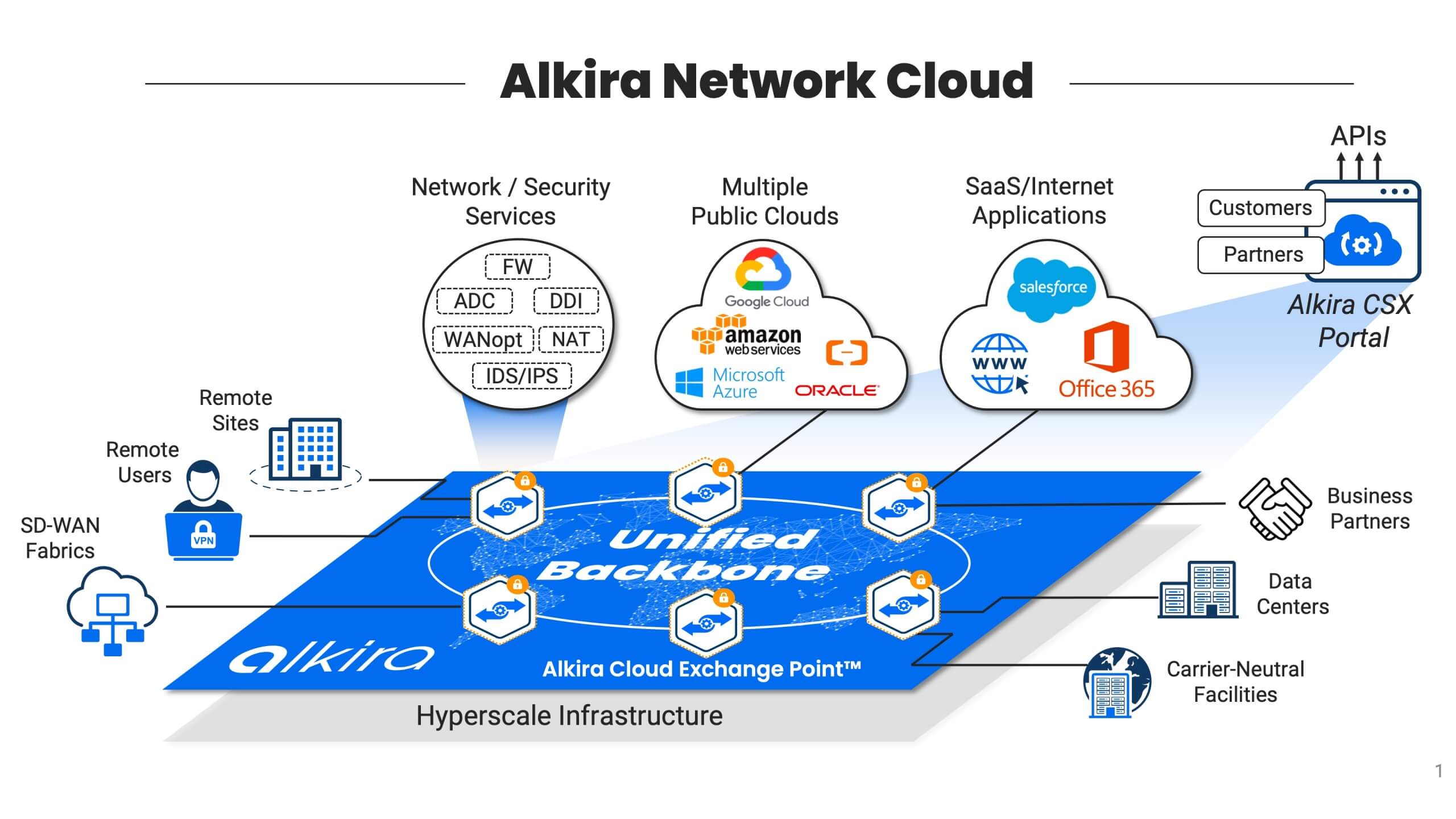
With the launch of Alkira unified backbone, Alkira can now seamlessly connect geographically dispersed users, sites and public clouds with a high bandwidth, low latency network. With integrated network and security services, visibility, segmentation offered as an on demand service, Alkira’s solution is not only technically superior but also very cost effective.
Unified Network Cloud
Cloud computing has changed the enterprise IT business landscape significantly; instead of buying expensive hardware, storage and databases IT teams can now rent these from cloud providers on a need basis.
With cloud native containers and microservice architectures gaining steam, software teams can now develop robust distributed applications on multiple clouds.
But the network to connect the sites and clouds today is a hodgepodge of legacy and cloud network constructs with very little visibility and controls. Enter Alkira, the network cloud company, with few clicks and within minutes, Alkira can create a single network highway across all sites and clouds using the Alkira unified backbone. And like any cloud offering the solution is offered as a service, there is no hardware to install or software to deploy, it can be spun up or down in minutes.
Cloud Network as a Service
As enterprises innovate, sustain and scale their business, the cloud workloads also grow to meet the increasing demand. The same elasticity should hold true for cloud connectivity and cloud services, this can be easily achieved through the Alkira portal.
For network connectivity, customers provision cloud and site connectors of a certain size with optional intent-based security and route policies. The solution then creates a network mesh with the required segmentation, the provisioned connector sizes guarantee a certain level of bandwidth in the Alkira unified backbone.
Now as their business needs evolve, customers can increase or decrease their connector sizes with minimal or no impact to resources. It should be noted that the underlying complexities, nuances and limits of all cloud networking constructs have all been abstracted out by the Alkira solution, customers can now focus on what matters most to them – getting the best value for their cloud applications.

For network services (like firewalls), Alkira supports both pay as you go and bring your own license models with auto scaling capabilities. Service instances are spun up (or shut down) as bandwidth exceeds (or falls) certain threshold limits. This way, security is never compromised for lack of bandwidth.
Pricing with Alkira
Generally speaking, for IT teams migrating from on-prem data centers to public clouds, the cost model changes from capex to opex business spend. If the shift from the existing fixed capex mindset to a more agile opex model does not happen soon, cloud expenditure could incur a lot of wastage. In fact, cost uncertainty is one of the major hindrances to cloud adoption. Thankfully with Alkira, multi cloud network pricing is greatly simplified,
- For the cloud connector of a certain size and type, you pay that fixed price per hour.
- For the on-prem connector of a certain size and type, you pay that fixed price per hour.
- For the network service of a certain size and type, you pay that fixed price per hour. If instances auto-scale, you pay for the time new instances were up.
- You pay for the bandwidth traversing the Alkira unified backbone.
That is it, there is no other cost component to the solution. If you change the connector size, you get billed for the updated connector from that point on. It is not only the technical gotchas, the pricing complexity of the cloud network constructs have also been extracted out to a simple cost/hour price. Like all cloud providers, Alkira pricing can be viewed as a monthly invoice, live from the portal and through APIs.
Monthly Invoice
Under the billing section in the portal, you will see an option to view monthly invoices. The invoice is intuitive, simple and very easy to understand. For every SKU, you will see units consumed (hours for connectors and GB for traffic), cost per unit and the total cost for that SKU in the month. At the end, you will see the total cost including monthly commitment charges and relevant discounts.
Portal
From the Alkira portal, you can quickly visualize the cost incurred for the current month till date, compare it to the previous month’s cloud costs and see the forecasted amount for the whole month. There is a visual breakdown of costs per connector, service and traffic flow, consumption pattern can be quickly grasped here.
Alerts
Organizations want to be cost aware and cost conscious, they want to be proactive to cost anomalies and take corrective action immediately. With Alkira’s billing, you can set a maximum amount threshold in the portal, an alert is generated to the given email address once the threshold is reached.
API
Monitoring and optimizing cloud costs is not a one and done deal, it has to be a recurring effort with feedback loops from previous iterations. Manual intervention and analysis will not work beyond a certain scale, there should be an automated way to synthesise billing data from various data sources. With Alkira’s billing APIs, you get real time cloud network cost data that can be easily integrated with other cost management tools and dashboards.
Tags
We saved the best for the last, all resources in Alkira support multiple billing tags (or labels). Tags are like cost containers, they categorize resources into desired buckets to provide rich and detailed billing report data. Each tag is a key-value pair, they get associated with the resource’s metadata and are valid for the entire lifecycle of the resource. Tags can be used to identify a resource along the following lines:
- Application
- Business Unit
- Environment
- Project
- Team
From the Alkira billing console or the invoice, costs/tag breakdown is readily available. With effective tagging strategy, customers gain invaluable insights and clarity around their cloud costs and usage. Resources can now be reprioritized or reassigned, chargeback can be done to the right department for their cloud usage.
Conclusion
In conclusion, Alkira has greatly simplified cloud complexity, both on technology and on economics. It is an industry first, a network built for the cloud, in the cloud and priced like the cloud. With zero upfront costs, every dollar spent on Alkira is a dollar well invested.
To learn more, read the whitepaper by Atif Khan, Founder and CTO of Alkira – https://www.alkira.com/discover/
To request your own personalized demo – https://www.alkira.com/demo/



コメントを記入